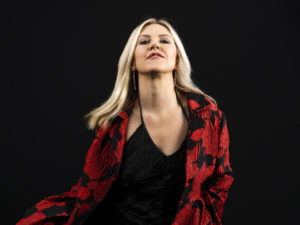ABC / Double J
March 7, 2019
Liz Phair opens up about proving the boys wrong and dealing with the pitfalls of success.
The road to Liz Phair’s career as a musician started with a dare.
“I had moved to San Francisco after graduating from Oberlin College,” she tells Double J’s Gemma Pike for The J Files.
“A lot of my friends from school were living there. I was living this sort of bohemian existence; I didn’t have a job and I was just living off my savings. I always played guitar and wrote songs privately, but I was way too shy to express them in from of other people.
“One day, in our loft in San Francisco, my friend’s boyfriend knew I was moving back to Chicago and he dared me to send him a tape with all of my songs. Because, when I’d play them for people, I’d start to stammer and sweat. I was very nervous.”
Phair admits to feeling a little lost at this stage of her life. Full of ambition, but no idea what to do with it. But she had these songs, so she recorded them under the moniker of Girly Sound and shared them with friends.
“I made these tapes and sent them to two friends,” she explains. “Those friends started making cassette tapes for their friends. One of them in particular, Tae Won You, sent them to these fanzines that were popping up all over the Pacific Northwest and the Midwest and New York and Boston.
“I came to the attention, because of one of these reviews, of Gerard Cosloy at Matador Records. That’s sort of how I bridged the gap between dreaming about a career and actually having one. I just made my own music and put it out. I did it enough and my friends helped enough that it got noticed.”
Exile In Guyville
One thing led to another. Phair signed a record deal. Then, another dare – this one from her boyfriend at the time – led her to make her revered debut album, Exile In Guyville.
“I asked him, ‘What’s a really good album?’ Almost as a pupil. ‘How do you make an album?’ I needed something to study. I needed to know what was considered an excellent album.
“The apartment I was renting at the time had a music collection that the previous tenant had left behind. He just pulled [the Rolling Stones’ 1972 classic Exile On Main St] out and said, ‘Why don’t you do a double album?’ Kind of daring me. Expecting me to fail. I caught that little nuance in his tone and I was like, ‘Well maybe I will!’.”
The record served as an immense source of inspiration for the fledgling Phair, who took an utterly unique approach to her first full-length album.
“I started to pretend that Mick’s lyrics were actually the guy I had a crush on, as if he were playing that part,” she explains.
“I was writing the female lead, who’s sort of referenced in the songs, but she doesn’t actually get to say anything. So I sort of took on the female role that was implied but not actually written. It had this sort of duet going on back and forth between Exile on Main St and the record I was making.”
Liz Phair released Exile In Guyville in 1993 and it was an instant hit, by indie label standards. At the time, Matador had never released an album this commercially successful and it was among the most critically revered records of the 1990s.
Liz Phair had every reason to be happy. Her songs and her expressions were not only being heard by hundreds of thousands of fans, they were being lauded. But she wasn’t happy.
“I was really traumatised,” she says. “I had not thought it through.
“I didn’t think anyone outside of my neighbourhood would ever hear this. I thought I was making a record for people I already knew, trying to show the boys that I could do what they did, and trying to express myself in the way that I had always done with my art. That I had always done privately in my bedroom with my guitar.
“I really thought I was going to hit a five-by-five-mile radius with this record. It was getting national coverage. It was terrifying.”
With fame comes attention and media commitments, things that Phair was completely unprepared for.
“I even sort of developed an eating disorder from all of the photo shoots. They would dress me in the most revealing, provocative outfits they could find, because of the lyrics on a couple of songs.
“’Oh, she likes sex!’ So, they’d put me in waders with suspenders over my nipples. I’d be in a room with like 30 people I didn’t know, while they’re having a party while I’m having a photo shoot. It was very traumatising.
“I did not enjoy my early career at all. It was just one horror to the next.”
An angel with wings of fire
It’s no surprise that her uncomfortable relationship with fame served as the initial inspiration for …Guyville’s follow up. But that’s not where her second album, 1994’s Whip-Smart, ended up.
“The first attempt at recording my follow-up album was kind of a disaster,” she says. “I wrote all about my feelings about being famous and my feelings about being vilified in the press.
“I think my lawyer said, ‘Liz, no one wants to hear eight songs about the music industry. You can’t record this’. So, I took a bit of time off and went deeper. I looked through old songs and found the personal story of my life to write about.”
The then-26-year-old artist needed to evolve creatively. But she was also acutely aware that people would be anticipating a similar record to her enormous debut offering.
“At first, it’s very destabilising to have a lot of success quickly,” she says. “People are expecting you to repeat another version of what you’ve already done, which is not the kind of artist I am. That was another hard target to hit. To do what I was interested in now while, at the same time, being able to progress as someone who was still learning a lot at that point.”
She managed to negotiate these conflicting expectations of herself as well as external ones, recording another very good record with a couple of songs that really hit a nerve with indie rock fans the world over.
Exile In Guyville had established Phair as a strong feminist voice in rock’n’roll, and Phair saw a song like Whip-Smart lead-single ‘Supernova’ as a continuation of that.
The song has visceral descriptions of physical love, as Phair sings about ‘sweet and slippery’ lips, and says her lover ‘fucks like a volcano’.
“At that point I’d gotten over the hump of saying dirty things in a song and having people hear it,” she says.
“I’d experienced that, so it wasn’t so terrifying anymore. I wanted to just kind of write about the joy of being in love and having sex be a part of that.
“Women, when they publicly talk about love, are supposed to stay in the lane of non-carnal. Not to describe how their body feels about their man. Or how they’re reacting.
“I’m so awestruck by the fact that my body, which has evolved over millions of years, has these responses and it’s all wrapped up with the emotions that I’m feeling. I wanted to describe every level of that in a song.”
The song became one of Phair’s biggest hits, even cracking the top 50 here in Australia and landing at number 33 in the Hottest 100 of that year.
“It was one of those great rock songs that I have always aspired to write,” she says. “It was so effortless.”
Girls! Girls! Girls!
Her third album, 1998’s whitechocolatespaceegg saw Phair deal with a major label for the first time, as the record was handled by both her initial home of Matador Records and the giant Capitol Records.
“That was a whole different ball of wax,” she says. “That was really shocking and upsetting.
“I can remember meeting the president for the first time, having him look at what I was wearing and suggest that I put on something sexier, because I was going to a radio station. I think I was told that, if the guy tried to feel me up, I should let him. Because that’s what they did.
“I can just remember that moment in that big conference room, feeling like, ‘Are you kidding?’.
“Then I met some other bigwig who stood up and did some schtick like, ‘Are you ready to be a star?!’
“It was just surreal, to really take my first breath of air in the stratosphere of true mainstream success. That was a whole different thing. I never really acclimated to it very well. I think I’m a true indie artist.”
It’s not as though Phair hadn’t had to deal with naysaying men in the music business before. Her early years were filled with anxiety about how to negotiate an industry in which there were so few figures with power she could relate to.
“One of the most difficult and daunting parts about trying to work in the music business was how male-dominated it was,” she says.
“I think people really can’t believe now, because there aren’t that many witnesses. There were so few women in the scene to begin with, it’s sort of our word telling you.
“It was really, really heavily male. They were the gate-keepers of the recording studios, they were the booking agents, they were the A&R representatives, they were everybody. They were the artists.
“It was intimidating, not only to get up on stage and sing these personal songs, but it was also frightening to believe in yourself when the guys around you seemed to all know each other and all had common language about what bands were good, what bands were bad. You might like entirely different artists and they might make fun of you. They saw me as a girlfriend type and not an artist, until I showed up on stage and just did it.”
On Exile In Guyville, Phair wrote from her perspective. A perspective she hadn’t heard on record or seen in her local scene before.
“I realised that men were free to talk about sex in a way that women were not,” she says. “I was tired of listening to the radio and hearing the songs by women sort of sketch out a character that was always passive and always sorry or sad or whatever. I wanted to express that in a way that was very real and very raw.
“I felt invisible. I felt the real-life experiences of women were largely invisible. I wanted to show that, not only could I sling it back and forth like a man, in the words, but I could also keep my emotion, keep my femininity inside, [while] being tough.”
And that hits at the core of what has driven Liz Phair throughout her career.
“That was the game for me,” she says. “That’s what I’m still trying to do.
“That, for me, is the highest aesthetic. The contrast between wanting to be tough and be competitive in the world, without losing my emotional sensitivity and my femininity and my true romantic passions.
“That wasn’t an archetype that I saw prevalent. I saw the tough girl, or the sensitive, passive girl. I never saw the two combined. I wanted to be the embodiment of that.”
When asked why she feels men have been reluctant to make space for women to perform in a similar way, Phair’s responses are measured. This has been her life for decades, she’s had plenty of time to think about it.
“I think it’s territory that they have controlled that they are loathe to share,” she says.
“If you look at it from a historical point of view, marriage and the laws of the land favoured men having freedom and women being property, more or less. Even though that’s no longer the case, we’re not nearly as far away from the unconscious bias as we think.
“I truly think men have been able to put women in a compartment and be like, ‘Okay, that’s the woman thing, that’s a women area’. As we pop up into their other compartments, they’re like, ‘What are you doing here? Do I have to change what I say now? Do I have to act differently? What is going on?’
“I don’t even think it’s that deep. Some people will say there’s misogyny and sexism rampant – and clearly there is – but I don’t encounter that many evil men in my life, I just encounter people, kind of like my father, who just don’t want to be bothered with re-arranging his grain to accommodate a new reality.
“I think a lot of times people just like the system, they’re working the system, they signed up to participate in a certain kind of system. When it changes under their feet, it just upsets them. They want order, they want predictability.
“Women have been sidelined traditionally and that’s what we’re changing. And it’s upsetting. Other than that, the only other conclusion I can draw is that they cannot see us as full-formed human beings the way they are. That’s the darker side. I hope it’s not that.”
Liz Phair: popstar?
Phair’s most controversial turn came in 2003 when she, seemingly out of nowhere, morphed into something of a teen pop star. Her eponymous album of that year, her second with Capitol, does not sound anything like the three that came before it.
“It was the first record I recorded when Matador had left the major label and I was the only artist left still on the major label,” she says. “I found myself without a home for the first time. I think that’s reflected on how diverse the production styles are on that self-titled album.
“I went through about three or four recording periods to make that record. Then I sort of cherry-picked my favourite numbers from all the different situations I’d been through.”
Some of the album’s most unexpected pop moments come via singles ‘Why Can’t I?’ and ‘Extraordinary’, two songs Phair made with The Matrix, a production group famous for working with the likes of Avril Lavigne, Shakira and Britney Spears.
Phair didn’t know who The Matrix were when she agreed to meet them. What she discovered was quite a shock.
“The Matrix were a very high-powered pop team who I actually knew socially before I realised what they did for a living,” she says.
“When I went to meet them for the first time – and I was very uncertain whether I wanted to enter into this pop world – I knocked on their door and Lauren [Christy] opened up the door. There was Graham [Edwards] and Lauren. I couldn’t believe it.
“They said, ‘We thought maybe you didn’t know it was us’. They call themselves The Matrix, how would I know? Matrix sounds like you’re going to a government building where they secretly tap everybody’s phones. They were just people I knew and they were hilariously funny and awesome.”
One thing Liz Phair wants you to know about that self-titled pop album? She wanted to do it. This was not a hostage situation.
“As much as it is couched in the public’s mind that I got sucked up by a spaceship and forced to do pop, I was actually just saying, ‘Okay, pop’s a different medium. I can try that on just the way I would try writing anything’,” she says.
“I loved working with them as people. I trusted them. It was a different sound and a different look. But just like wearing clothes, sometimes you want to dress up for the red carpet and sometimes you just want to skulk around in your sweats.”
The album performed relatively well. Contrary to what happened in the wake of Exile In Guyville a decade earlier, Phair loved her time in the sun.
“I came out with a pop record that the press sort of lambasted me for making, but I enjoyed my success so much more the second time around,” she says.
“Because I knew what was going to happen, I knew who I was and how I wanted to interact with all of those forces of celebrity and sales and fame and stuff.”
Good Love Never Dies
Liz Phair will release her first of two memoirs later this year, but she also sees a great deal more music in her future. She wants to make a lot more records, despite the fact her last album was released almost a decade ago.
“Oh, there’s so much more I need to say,” she beams. “Every day I feel like there’s more I need to say.
“I need to write my Pink Moon. I need to record my Modern Lovers album. I need to do something with Brad [Wood, producer] again, do something Guyville-esque.
“I do feel, now that I’m older, that you think about time more. If you’re gonna leave the planet, what do you need to leave behind? It turns out I have a huge long list.
“So, I pretty much just try to make stuff all the time and keep records of it. When I talk to labels and interview people, my question is, ‘How much output can I do? What are you okay with?’ Because I just want to make art all the time.”
Featured Image: Liz Phair (Photo: Elizabeth Weinberg)










